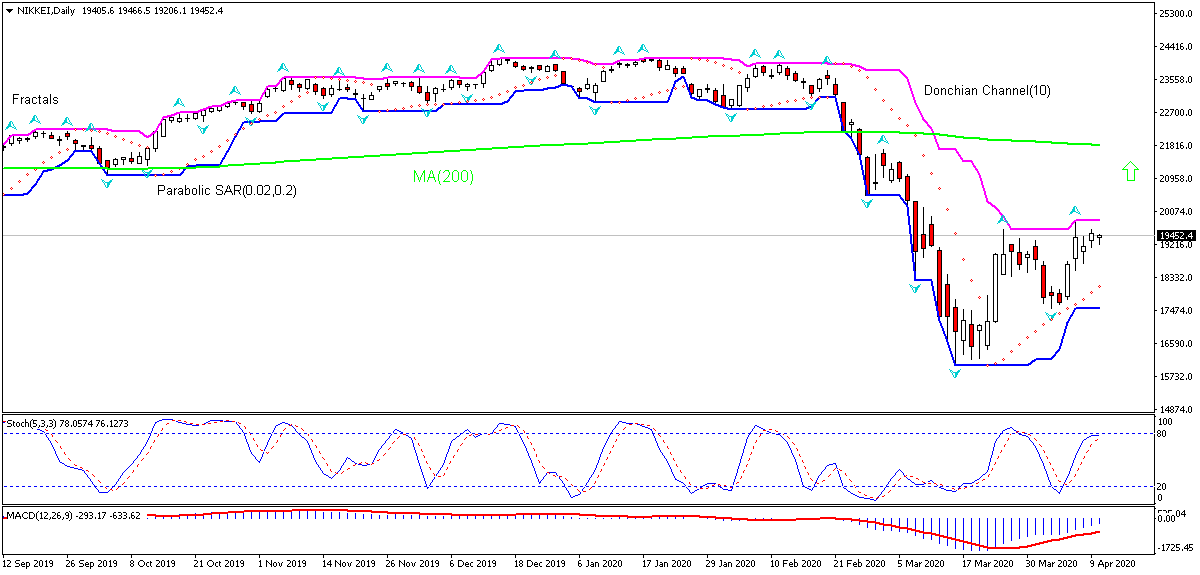- Analisis
- Analisis teknis
Nikkei Analisis teknis - Nikkei Jual beli: 2020-04-10
Nikkei (225), Stock market index Technical Analysis Summary
Atas 19854.6
Buy Stop
Bawah 17529.9
Stop Loss
| Indicator | Signal |
| MACD | Buy |
| Stochastic | Neutral |
| Donchian Channel | Neutral |
| Fractals | Buy |
| Parabolic SAR | Buy |
| MA(200) | Sell |
Nikkei (225), Stock market index Chart Analysis
Nikkei (225), Stock market index Analisis Teknis
On the daily timeframe the Nikkei: D1 is rising toward the 200-day moving average MA(200) after hitting 37-month low in mid-March. We believe the bullish momentum will continue after the price breaches above the upper boundary of Donchian channel at 19854.6. A level above this can be used as an entry point for placing a pending order to buy. The stop loss can be placed below 17529.9. After placing the order, the stop loss is to be moved every day to the next fractal low, following Parabolic signals. Thus, we are changing the expected profit/loss ratio to the breakeven point. If the price meets the stop loss level (17529.9) without reaching the order (19854.6), we recommend cancelling the order: the market has undergone internal changes which were not taken into account.
Fundamental Analysis Indeks - Nikkei (225), Stock market index
Japan’s economic data have been mixed in recent weeks. Will the NIKKEI rebound continue?
Recent Japanese economic data were mixed. Current account surplus widened in February while machinery orders decline accelerated. The Tankan index for big manufacturers' sentiment fell to a seven-year low of -8 in the first quarter of 2020 from 0 in the prior period, though it still came above market expectations of -10. At the same time large firms indicated plans to rase capital expenditures by 1.8%, down from 6.8% in the previous quarter but above a 1.1% expected decline. And while machinery orders decline accelerated in March to 2.4% over year from 0.3% in February, the decline was smaller than feared. Meanwhile machine tool orders decline accelerated sharply next month to 40.8% over year from 29.6% in February. However, Japan’s government unveiled a monetary and fiscal stimulus package on April 7 to combat coronavirus impact. The total package is worth 108 trillion yen ($990 billion), equal to 20% of Japan’s gross domestic product, with direct fiscal spending amounting to 39.5 trillion yen, or about 7% of the GDP. These measures, together with monetary stimulus program by other developed economies including the US and European Union, buoyed investors’ confidence, leading to recovery in equity market.
Explore our
Trading Conditions
- Spreads from 0.0 pip
- 30,000+ Trading Instruments
- Stop Out Level - Only 10%
Ready to Trade?
Open Account Perhatian:
Tinjauan ini memiliki karakter informatif dan tutorial dan dipublikasikan secara gratis. Semua data, termasuk dalam Tinjauan, diterima dari sumber publik, diakui kurang lebih dapat diandalkan. Apalagi, tidak ada jaminan bahwa informasi yang ditunjukkan penuh dan tepat. tinjauan tidak diperbarui. Keseluruhan informasi dalam setiap tinjauan, termasuk pendapat, indikator, grafik dan hal lainnya, disediakan hanya untuk tujuan pengenalan dan bukan saran keuangan atau rekomendasi. Seluruh teks dan bagiannya, serta grafik tidak dapat dianggap sebagai tawaran untuk membuat kesepakatan dengan aset apa pun. Pasar IFC dan karyawannya dalam kondisi apapun tidak bertanggung jawab atas tindakan yang dilakukan oleh orang lain selama atau setelah membaca tinjauan.


